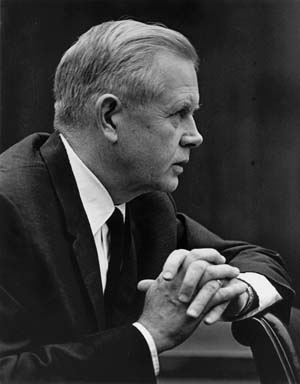Remarks by Gerald F. Tape, Commissioner U.S. Atomic Energy Commission

Gerald F. Tape, Commissioner U.S. Atomic Energy Commission
I am particularly encouraged by the fact that my friend, Dr. Robert Wilson, and his able staff have elected to break ground for the first major building of the National Accelerator Laboratory without regard to season of the year. As a former faculty member at the University of Illinois, I have lived in this state long enough to know that groundbreaking ceremonies at this time of year can test not only men but shovels. A group determined to implement its plans with such determination will be hard to stop.
This Laboratory is an act of enlightened faith. We do not know what it will teach us about the nature of matter. We cannot forecast with precision how much it will add to our understanding. But as has been told many times, we hope that our scientists will be smart enough to ask the right questions when the proper time comes. The questions we would ask today are no doubt not the ones we will wish to ask when the machine is in operation and responding to the probing of the experimenters. History has borne out the faith of those who have embarked on similar projects in the past. I expect we will be equally rewarded in the future.
Our nation has demonstrated, before, its willingness to invest in sources for new knowledge. The first major allocations of national resources to exploring the mysteries of the atom resulted from wartime experiences and our continuing defense needs. Today we are spurred not by wartime needs but by a quest for significant knowledge, by a sense of wonder and curiosity about the fundamental truths of our universe. One cannot predict the future sequence of events. But just as we can trace the lineage of such technologies or activities as optics, photography, and even space exploration back to basic laws formulated by Sir Isaac Newton two and a half centuries ago, so too will the studies of submicroscopic particles lay a foundation for applications as yet undreamed of.
Despite a slowdown this year generally in outlays for research, Congress, particularly the JCAE, understands the importance of the NAL project as a necessary and important research tool in pushing back the frontiers of knowledge. We live in Marshall McLuhan's "global village," a small place, where we are closely watched by our neighbors and judged by our actions. In making this commitment to the 200 BeV accelerator, the United States is declaring publicly that we intend to stay in the forefront of science and technology.
But in today's action there is implicit another declaration as well. Particle physics is a prime example of peaceful competition on an international scale. We hope to share the fruits of our research here with all of the scientific community around the world not only as results but in producing those results as well. We have demonstrated our willingness to do this in the past and not only just with our free world colleagues. The world fraternity studying particle physics is a large one, and we hope it can be used to bring nations closer together rather than divide them. As a famous Illinois statesman, Adlai Stevenson, observed, "Nature is neutral. Man has wrested from nature the power to make the world a desert or to make the deserts bloom. There is no evil in the atom; only in men's souls."
The National Accelerator Laboratory will be good for the economy of Illinois, but that is only the beginning. The benefits begin with this coninunity but rapidly embrace the entire region and the nation. These benefits are only in small part economic. The greatest part of the National Accelerator Laboratory's contributions, will be to our better understanding of nature, to higher education as an assist to academic science, and in time to all education as an enrichment of our entire culture.
This Laboratory is a noble enterprise. I know it will bring honor to all those associated with it, and benefit not only scientists and not only this nation but men of many skills and vocations and indeed the entire world.


